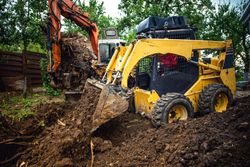What Homeowners Should Know About Radon Testing

Radon is an odorless, tasteless gas that occurs naturally in the environment. It’s released by the breakdown of various soil components, and at low levels, is not harmful. However, if you live in a home with high levels of this gas, you could face a higher risk of developing lung cancer. Fortunately, with radon testing, homeowners can assess these risks and take steps to correct the problem. If you’re new to the process, here’s some critical information that could save you and your loved one from a dangerous disease.
What Are the Risks of Radon?
When radon is inhaled, it decays into radioactive particles. These particles damage healthy lung cells, and over time, cause them to become cancerous. It’s estimated that radon exposure is responsible for as many as 22,000 lung cancer deaths in the United States.
When Should I Schedule Radon Testing?
 If you’re purchasing a new home, you should use a short-term radon testing kit to determine the current gas levels. However, you should continue to use long-term testing every few years to make sure no changes in exposure have occurred. You might also need to conduct testing if you disrupt the soil near your home—such as during large construction projects.
If you’re purchasing a new home, you should use a short-term radon testing kit to determine the current gas levels. However, you should continue to use long-term testing every few years to make sure no changes in exposure have occurred. You might also need to conduct testing if you disrupt the soil near your home—such as during large construction projects.
How Is Radon Detected?
Since this gas has no odor or taste, it can only be detected with special equipment. The best way to measure levels in your home is to use long-term radon testing equipment. With this test, a special device monitors gas levels in the home over 90 days. Since radon levels can vary from day-to-day, this long-term test is ideal, as it shows how levels change over time.
How Do You Reduce Radon Levels in the Home?
If you have dangerous radon levels in your home, hire a mitigation specialist to detect and resolve problem areas. Some common mitigation techniques include sealing cracks in the foundation or installing a ventilation system to direct radon out of the home.
Whether you’re purchasing real estate or are a long-time property owner, A-Pro® Home Inspection Services in Denver, CO, offers comprehensive radon testing to make sure your home is safe. Using professional equipment, these specialists will carefully detect changes in your home’s environment to determine your possible exposure to the gas. For other safety and structural concerns, this team also offers comprehensive building, termite, and mold inspections. Call (303) 875-7627 to schedule an appointment with a certified home inspector.
About the Business
(8 reviews)
Have a question? Ask the experts!
Send your question

